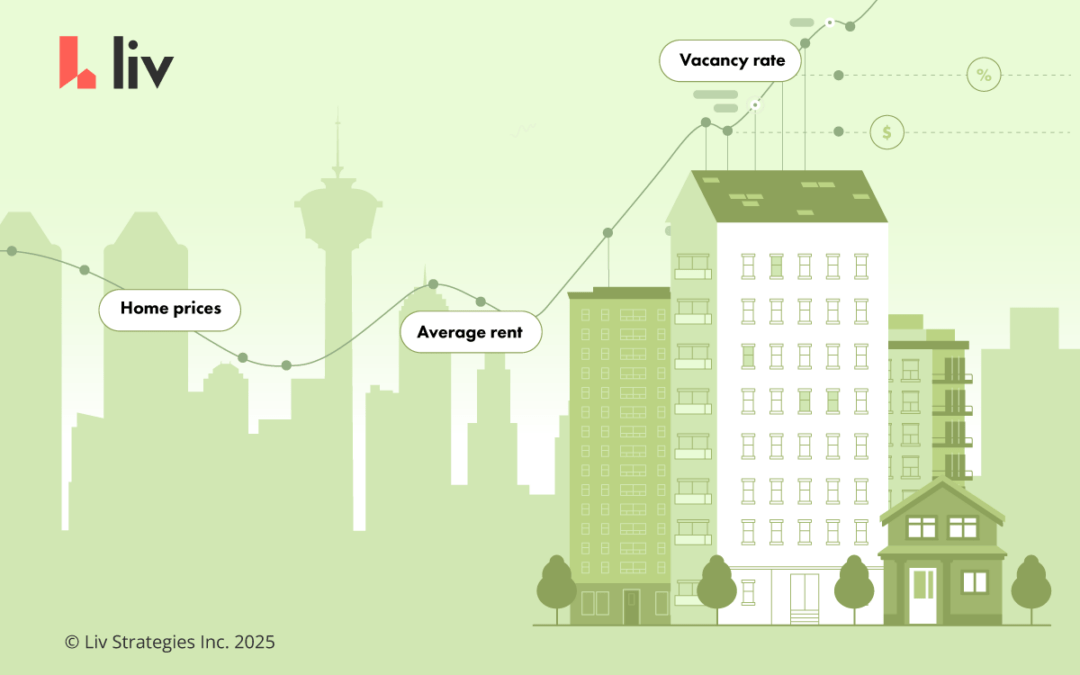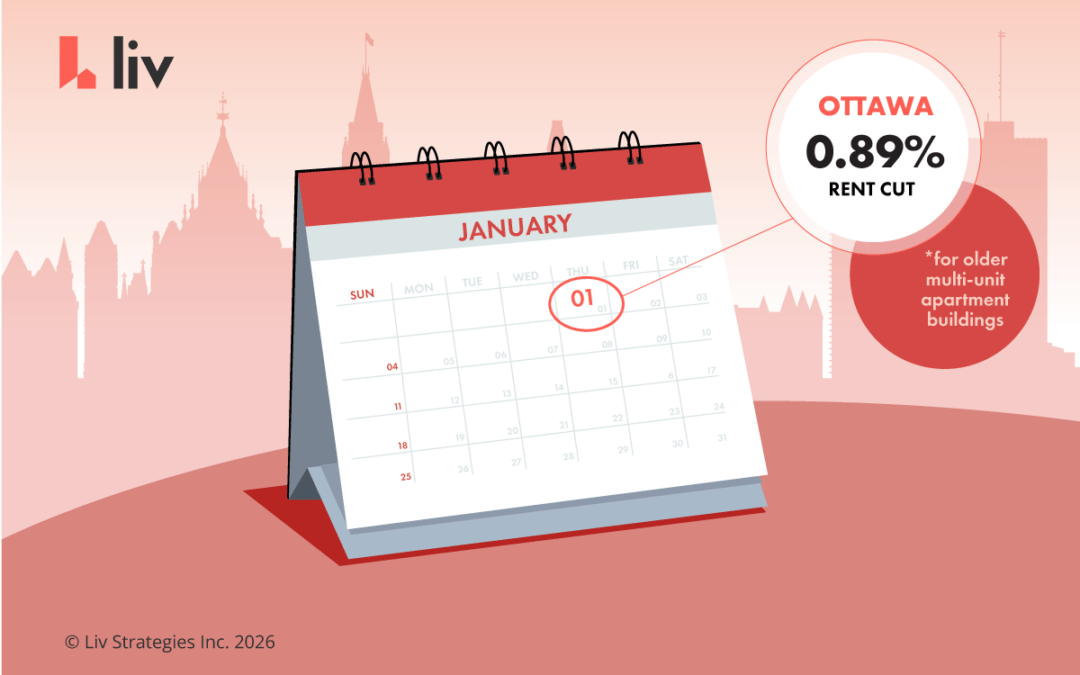Understanding the rules around rent and security deposits in Canada is essential for both tenants and landlords. These upfront payments play different roles depending on the province or territory and can significantly impact rental agreements. While some provinces allow only a rent deposit (commonly used for last month’s rent), others permit a security deposit to cover potential damage or unpaid rent. In this liv.rent guide, we’ll break down the differences, legal limits, provincial regulations, and key terms to help you navigate what’s required and what’s allowed, whether you’re renting in Ontario, British Columbia, Alberta, or anywhere else in Canada.
Join Our Newsletter
For more info on rental laws and policies (e.g. eviction, lease agreements, repairs & maintenance), subscribe to get the latest news.
What is rent deposit?
A rent deposit is a sum of money paid by a tenant to a landlord before moving into a rental property. This deposit is typically applied to the last month’s rent and is not intended to cover damages or other expenses. It provides the landlord with financial assurance that the tenant will either occupy the property or compensate for breaking the lease early.
In many Canadian provinces, rent deposit rules are strictly regulated to protect both landlords and tenants. While it’s often confused with a security deposit, the two serve different purposes. For example, last month rent collected as a rent deposit is meant to be used only toward rent, not repairs or cleaning.
Common traits of rent deposits across provinces:
- Purpose: Secures a portion of rent (usually last month).
- Timing: Paid at lease signing or before move-in.
- Limit: Often capped at one month’s rent.
What is security deposit?
A security deposit is a sum of money collected by the landlord at the beginning of a tenancy to cover potential damage to the rental unit, unpaid rent, or cleaning fees. Unlike a rent deposit, which is typically applied to the last month’s rent, a security deposit is meant to protect the landlord from financial loss due to tenant negligence or violations of the lease agreement.
Key characteristics of a security deposit for rent:
- Purpose: Covers damages, unpaid rent, or cleaning costs.
- Timing: Paid at the start of the tenancy.
- Refundable?: Yes, if the unit is returned in good condition and there are no outstanding charges.
- Legal limit: Varies by province, often capped at one month’s rent or less.
Understanding what is a security deposit helps clarify tenant and landlord responsibilities. It’s also crucial to distinguish between the two terms when discussing first and last month rent, as these payments are not considered security deposits in provinces like Ontario or Quebec.
Rent and security deposit comparison in general table
| Category | Rent deposit | Security deposit |
| Definition | Prepaid rent, usually for the last month of tenancy. | Money held to cover damages, unpaid rent, or cleaning fees. |
| Purpose | Ensures future rent payment (e.g., last month’s rent). | Typically, half to one month’s rent, depending on the province. |
| Refundable? | No, applied directly to last month’s rent. | Yes, refundable if no damages or outstanding charges. |
| Legal Limit | Usually one month’s rent (varies by province). | Typically half to one month’s rent, depending on the province. |
| Payment Time | Usually paid at lease signing or before move-in. | Paid at the start of the tenancy and held in trust (where required). |
What is rent and security deposit receipt?
Whether you’re a landlord or a tenant, a rent and security deposit receipt is an essential document that provides proof of payment. It protects both parties by confirming that a deposit has been paid and outlines the key details of the transaction. In some provinces, landlords are legally required to provide receipts upon request, especially for cash payments.
A receipt serves as formal documentation of the payment. It helps:
- Prevent disputes over what was paid and when.
- Ensure transparency between tenants and landlords.
- Fulfill legal obligations in many provinces.
To be considered valid, a rent deposit or security deposit receipt should include:
- The name and signature of the landlord or property manager.
- The name of the tenant.
- The date of payment.
- The amount paid.
- The purpose of the payment (e.g., rent deposit, security deposit).
- The address of the rental unit.
Both electronic and paper receipts are acceptable, but electronic receipts have become increasingly common. They offer easier storage, faster delivery, and help reduce administrative tasks. That said, some tenants still prefer a hard copy for their records.
Whether you’re paying first month and last month rent or leaving a security deposit for rent, always ask for a receipt and keep it for the duration of your tenancy.
Legal framework for rent and security deposits in Canada
The legal handling of rent and security deposit payments varies significantly across Canada, depending on the province or territory. While there is no unified federal law regulating rental deposits, each region has its own residential tenancy legislation that sets out clear rules on how much can be collected, when it must be paid, whether it must earn interest, and when it should be returned.
National overview vs. provincial regulations
Canada does not have a standardized national law governing rent and security deposit practices. Instead, each province and territory sets its own rules, resulting in a wide range of legal requirements. These regional regulations determine whether last month’s rent can be collected in advance, whether security deposits are permitted, and how those deposits must be stored, often requiring placement in trust accounts. Provinces also dictate whether landlords must pay interest on held deposits and how quickly the funds must be returned after a tenant moves out.
For example, in Ontario, landlords are only permitted to collect a rent deposit to cover the last month’s rent, and collecting a security deposit for rent is not allowed under any circumstances. In contrast, British Columbia and Alberta allow security deposits, but impose strict rules such as mandatory trust accounts and deadlines for returning the deposit. Quebec takes an even stricter stance, prohibiting landlords from collecting any kind of deposit, including both rent deposit and security deposit.
Given these regional differences, both landlords and tenants must understand the laws specific to their province. Failing to comply, whether by charging an illegal deposit or failing to return one on time, can result in legal consequences or penalties.
Rent deposit and security deposit applicable across Canada: province-by-province rules
Each province in Canada handles rent and security deposit laws differently. Below is a summary of the key regulations in major provinces and territories, helping both tenants and landlords understand what’s allowed and what’s not.
Ontario rent and security deposit laws: key rules and limits
In Ontario, landlords are only permitted to collect a rent deposit, which is typically used to cover the last month’s rent. This amount cannot exceed one month’s rent, and it must be applied to rent, not for damages, cleaning, or any other purpose. Security deposits for rent are not allowed in Ontario under any circumstances. Additionally, the rent deposit does not earn interest for the landlord, but landlords must pay the tenant yearly interest equivalent to the guideline rent increase amount, even if no increase is applied.
British Columbia (BC) rent and security deposit laws: security deposit cap and interest
In British Columbia, landlords may not collect a rent deposit, but they are allowed to request a security deposit, typically equal to half a month’s rent. If the tenant has a pet, a separate pet damage deposit may also be charged, up to another half month’s rent. Landlords must hold this deposit in trust and return it within 15 days of the end of the tenancy. Interest is required and must be paid based on BC’s annual interest rate schedule for residential tenancies.
Rent and security deposit laws Alberta: separate trust accounts for deposits
Alberta allows landlords to collect a security deposit but not a rent deposit. The law does not set a strict cap on the amount, but most landlords charge the equivalent of one month’s rent. Landlords must place the deposit in a separate trust account and are required to pay interest on it, which accumulates annually. The deposit must be returned within 10 days if no deductions are made, or within 30 days with a statement of account and receipts for deductions.
Rent and security deposit laws Quebec: no security deposit rule
Quebec has some of the strictest regulations in Canada. Landlords are prohibited from collecting any kind of deposit, which includes both security deposits and rent deposits. Tenants are only required to pay their monthly rent as outlined in the lease, with no advance payment beyond the current month. This regulation is designed to prevent financial barriers to housing and to protect tenant rights.
Rent and security deposit laws other provinces: brief summaries
| Province/Territory | Rent deposit allowed | Security deposit allowed | Maximum limit | Interest required? | Notes |
| Ontario | ✅ Yes (Last month only) | ❌ No | One month’s rent | ❌ No | Interest required only if the tenancy exceeds 5 years. |
| British Columbia | ❌ No | ✅ Yes | ½ month (damage) + ½ month (pet) | ✅ Yes | Deposit must be returned within 15 days. |
| Alberta | ❌ No | ✅ Yes | No fixed cap (commonly 1 month) | ✅ Yes | Must be held in a trust account. |
| Quebec | ❌ No | ❌ No | Not applicable | Not applicable | Landlords cannot collect any form of deposit. |
| Manitoba | ✅ Yes | ✅ Yes | ½ month’s rent | ✅ Yes | Must be returned within 14 days. |
| Saskatchewan | ✅ Yes | ✅ Yes | One month’s rent | ✅ Yes (if >5 years) | Interest required only if tenancy exceeds 5 years. |
| Nova Scotia | ✅ Yes | ✅ Yes | ½ month’s rent | ✅ Yes | Must be held in a trust account. |
| New Brunswick | ✅ Yes | ✅ Yes | One month’s rent | ✅ Yes | Deposit returned within 7 days of tenancy end. |
| Prince Edward Island | ✅ Yes | ✅ Yes | One month’s rent | ✅ Yes | Must be returned within 10 days. |
| Newfoundland and Labrador | ✅ Yes | ✅ Yes | ¾ month’s rent | ✅ Yes | Interest must be paid annually. |
| Yukon | ✅ Yes | ✅ Yes | One month’s rent | ✅ Yes | Must be held in trust. |
| Northwest Territories | ✅ Yes | ✅ Yes | No specific limit | ✅ Yes | Must be returned within 10 days. |
| Nunavut | ✅ Yes | ✅ Yes | One month’s rent | ✅ Yes | Standard rules apply for refunds and interest. |
Which province is rent deposit and security deposit legal?
Both rent deposits and security deposits are legal in most provinces across Canada, but the rules vary. Some provinces allow only one type, while others set strict limits on the amount, timing, and use of the deposit. For example, Ontario allows rent deposits but not security deposits, while Quebec doesn’t allow either. You can find a province-by-province breakdown of where each type of deposit is legal and what rules apply in the table above.
Where can I get assistance or help with rent and security deposit?
Navigating rent and security deposit laws can be confusing, especially with each province having different rules. Fortunately, there are many resources available to help both tenants and landlords understand their rights and obligations.
If you’re unsure whether a rent deposit or security deposit for rent is being handled correctly, or if you’re facing issues with refunds, deductions, or legal compliance, these services can provide guidance:
- Provincial/Territorial Residential Tenancy Boards: Every province has a governing body that handles rental disputes and provides up-to-date legal information. Examples include the Landlord and Tenant Board (Ontario), Residential Tenancy Branch (BC), and Régie du logement (Quebec).
- Legal Aid Services: Tenants facing disputes or eviction related to 1st and last month rent or deposit disagreements may be eligible for legal assistance.
- Tenant Advocacy Groups: Non-profits and community organizations offer free or low-cost help, particularly in larger cities.
- Local Housing Authorities: Municipal governments often have tenant helplines and housing outreach services that can answer questions and direct renters to appropriate channels.
Can a landlord collect advance rent and security deposit?
In most provinces across Canada, landlords are allowed to collect either a rent deposit, a security deposit, or both, depending on regional legislation. However, the issue becomes more complex when landlords request advance rent in addition to a deposit, as this can lead to confusion or even violate rental laws.
What’s considered “advance rent”?
Advance rent generally refers to any payment for rent that covers a period beyond the current or upcoming month. For example, requiring tenants to pay the first and last month’s rent at lease signing is common in Ontario and considered legal. However, asking for multiple months of rent in advance, like six months or a full year, is typically not allowed unless the tenant voluntarily offers it or is outside typical provincial protections (such as in commercial tenancies or with international students in rare exceptions).
Provincial rules on collecting both in advance
- Ontario: Landlords can collect a rent deposit equal to one month’s rent (for the last month), but cannot collect both advance rent and a security deposit.
- British Columbia & Alberta: Security deposits are allowed, but rent must be paid monthly, and landlords cannot require several months of rent in advance.
- Quebec: Collecting any rent or security deposit in advance is illegal. Tenants only pay rent month by month.
- Other provinces: Rules vary, but most do not allow excessive advance rent combined with a deposit unless both parties agree and it’s written in the lease.
FAQs about rent and security deposit in Canada
What is the difference between rent deposit and security deposit?
A rent deposit is a payment made in advance to cover rent, typically the last month’s rent, while a security deposit for rent is meant to cover potential damages, cleaning costs, or unpaid rent. Rent deposits are applied to rent only, while security deposits are refundable if there’s no damage.
What is the difference between first month’s rent and security deposit?
First month’s rent is simply the initial rent payment before move-in and is not refundable. A security deposit is a separate payment held by the landlord and refunded (in full or part) if the property is returned in good condition.
Is first and last month’s rent a security deposit?
No. In provinces like Ontario, first and last month’s rent refer to rent-only payments. These are not security deposits and can’t be used to cover damage or cleaning costs.
When do you pay security deposit and first month’s rent?
Typically, both are paid before the tenant moves in, usually at the time the lease is signed. The security deposit must be held in trust where required by law, and the first month’s rent covers the initial rental period.
Is a security deposit refundable in Canada?
Yes, in most provinces. Landlords must return the security deposit (with interest, if required) within a specific number of days after tenancy ends, provided the property is left in good condition and there are no outstanding payments.
Can a landlord increase the rent and deposit each year?
Landlords may increase rent annually according to provincial guidelines. However, they cannot retroactively increase the original rent deposit or security deposit unless the monthly rent increases and provincial law allows the deposit to be topped up accordingly.
What are security deposits for?
Security deposits are collected to protect landlords from financial loss due to property damage, missed rent payments, or breach of lease terms. They are not meant to cover regular wear and tear.

Rethink The Way You Rent
Not on liv.rent yet? Experience the ease of digital applications & contracts, verified tenants & landlords, virtual tours and more – all on one platform. Sign up for free or download the app.
Subscribe to receive the latest tenant & landlord tips and get notified about changes in the Canadian rental market.
>> Stay up-to-date on the average rent in Vancouver, Toronto and Montreal: Rent Reports.




0 Comments